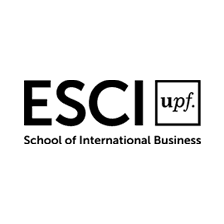
The Master of Science in Sustainability Management, a program designed for an international audience, offers you the technical and strategic keys to make sustainability one of the central focuses in the management of a company or institution. You will be trained to lead in sustainability from the perspective of its social, economic, and environmental dimensions.
The Master of Science in Sustainability Management offers a global vision of sustainability, offering a great opportunity for transformation that brings differentiation, value, and competitive advantage to organizations.
Sustainability management will be one of the most in-demand profiles in the coming years. Among its main challenges is knowing how to deal with the existing complexity between the current models of production, consumption, and business activity. This is in juxtaposition to a growing environmental and social awareness, and a paradigm shift, led by the change-makers, the Green Transition, the 2030 Agenda, and the sustainable development goals (SDG) of the United Nations.
With this master's degree you will acquire the necessary tools for the management of sustainability in companies, making it compatible with their social and economic interests. You will learn to implement sustainable management of companies and institutions, bringing strategic keys to operationalize concepts such as the circular economy, energy transition, or the SDGs.
The master's degree addresses the three dimensions of sustainability: the economic, social, and environmental dimensions. All this using a logic of practical projects, starting with a solid technical base, continuing with the keys of corporate management and culminating with an effective measurement of the impact, as well as subsequently communicating it to the interested groups (see Program Curriculum and Methodology).
The Master of Science in Sustainability Management is endorsed by Pompeu Fabra University, the 1st Spanish university and the 15th best university in the world (of those with less than 50 years), according to the Times Higher Education ranking. In addition, UPF Barcelona School of Management has EQUIS accreditation, the most prestigious institutional recognition for business schools globally.
The school holds the quality distinction of the Business Graduates Association (BGA), an accreditation that ensures the highest standards in business schools worldwide. UPF-BSM is the first and only business school in Spain to be accredited and the eighth institution in Europe to obtain this accreditation.
Since 2021, the UPF Barcelona School of Management has held the Business School Impact System (BSIS) label, awarded by EFMD Global. The BSIS report highlights that the school actively contributes to knowledge creation through its research projects with companies and local entities. The recent renewal of the BSIS label allows students to attend seminars, symposiums, and debates, fostering the exchange of ideas and intellectual discussion.
The program has a teaching team made up of professors and sustainability experts from the UPF Barcelona School of Management and ESCI-UPF. In addition, active professionals will share their experience and real cases throughout the course.
Program jointly offered with:
Why choose this program
International recognition
Study at a school accredited by EQUIS, international distinction that guarantees the quality of our institution and makes us the 1st school of management linked to a public university with this accreditation in our country.
In-demand professional profile
According to estimates by the International Labour Organization (ILO), the Green Transition will mean the creation of 24 million new jobs related to sustainability and digitalization in the coming years. This will mean a paradigm shift in the production system. In addition, it will force the work environment to adapt to a new, more ecological reality, increasing the demand for professional profiles trained in the field of sustainability.
Expert faculty in the field of sustainability
You will learn with a teaching team that approaches sustainability from different perspectives and with diverse specialties. The UPF-BSM, through several of its chairs related to sustainability, and ESCI-UPF with the UNESCO Chair in Life Cycle and Climate Change, bring together their knowledge and expertise to form a teaching team that will address sustainability from different perspectives and approaches.
Configure the program according to your interests
The study plan offers you the global vision necessary to understand the current ecological transformation of society and companies as a whole. Within the environmental, economic, and social sustainable dimensions, you will be able to choose from a large number of elective subjects to configure the program according to your needs and interests, in order to link the choice of subjects with the Master's Final Project.
Practical and experiential learning
The program offers you a set of experiential activities. These aim to introduce you to projects related to innovation in sustainability. You will learn about the strategies of different companies and institutions linked to sustainability and the green transition. During the programme you will be able to visit businesses from different industries, such as agri-food, waste treatment, and catering, among others.
Barcelona: leading city in urban sustainability
You will study in a city that is home to more than 1,000 organizations committed to working and promoting environmental, social, and economic sustainability and was the world capital of sustainable food in 2021. The urban transformation in which Barcelona is currently immersed is a case study in itself and a reference model for other cities.
Sulitest Certification
Students can obtain a Sulitest (Sustainability Literacy Test) certification, an internationally recognized credential valued by employers and institutions committed to sustainable practices. The certification helps students stand out in the job market and aligns their skills with the growing demand for sustainability expertise across various industries.
Who is it for?
The Master of Science in Sustainability Management is aimed at people who want to change the world by leading the sustainable transition that companies and institutions need. This master's degree is made up of people of all nationalities who want to create and move towards the sustainable transformation of society and organizations. Whether you have just graduated or whether you are a professional in any discipline and wish to position yourself in sustainability management, it is time to join this master's degree.
Accreditations
UPF Barcelona School of Management is the management school of Pompeu Fabra University, the 1st Ibero-American university and the 16th placed university in the world, among those under 50 years of age, according to the Times Higher Education ranking.
UPF Barcelona School of Management has EQUIS accreditation, the most prestigious institutional recognition for business schools globally, and places itself among the top business schools in the world.
The MSc in Sustainability Management is an official master's degree and has the academic recognition of the Ministry of Education of the Government of Spain. The Quality Agency of the University System of Catalonia (AQU) has also institutionally accredited UPF-BSM. This accreditation certifies all the official master's degrees that we teach and recognizes the quality of our educational model in accordance with the criteria of the European Higher Education Area (EHEA).
In 2023, UPF-BSM received Level 4 in the Positive Impact Rating (PIR), an international classification led by the opinion of the students themselves about the sustainability commitment of the world's leading business schools, recognizing UPF-BSM as a "transformative school".
Curriculum
The Master of Science in Sustainability Management is organized around four large modules which are developed following the different dimensions of sustainability:
1. Fundamentals of Sustainability
2. Environmental Dimension of Sustainability
3. Economic Dimension of Sustainability
4. Social Dimension of Sustainability
All students must take all the compulsory subjects and choose a total of six optional subjects, among those available in each of the modules. Students will have a tutor who will advise them on their choices according to their personal goals and professional interests.
Students can also undertake curricular internships in companies, which will be recognized as two optional subjects (6 ECTS).
Throughout the second and third term, students will work on their Master's Final Project, in which they must demonstrate the knowledge acquired during the program. During the first term, the teaching load of the Master's Final Project is reduced, since the student is yet to select the topic, and will take support and advice tutorials for its development.
Classes may be held both at the facilities of the UPF Barcelona School of Management, and at those of ESCI-UPF.
Professional internships (optional)
The assigned tasks will be agreed upon between the organization or company receiving the student and the management of the master's degree, always with the aim of responding to the real needs of said institution or company. The management of the master's degree will check that the assigned tasks are relevant and related to sustainability management. The knowledge acquired throughout the program must be put into practice during the internships in companies.
The 6 ECTS corresponding to professional internships are interchangeable for two elective subjects of 3 ECTS each.
Master’s Final Project
Participants must complete a Master's Final Project under the supervision of a mentor. There are two options: in the first, the participant carries out original research that leads to the implementation of a research project related to sustainability. In the second, with a practical approach, the student develops, for example, an analysis or audit applied to an organization, a sustainability implementation manual, a case study, or a strategic or consulting business sustainability plan.
Note on the Curriculum
Complementary activities
The Master of Science in Sustainability Management also includes the possibility of participating in practical activities and activities for personal and professional growth such as:
- Brush-up Courses: these preparatory courses cover business, analytic tools, economics, physical and chemical principles, and environmental subjects. They are designed for students needing a refresher before starting the program and must be completed and passed either before or during the first month of the master's program.
- Spanish Course: 80% discount during the first trimester for basic Spanish level. Three hours per week at the Language Service of UPF.
- Career Development Program: career sessions and workshops where participants obtain specific training on how to improve their professional profile, approach potential employers, and develop professional soft skills.
- International mobility: The UPF Barcelona School of Management offers you the possibility of expanding your training and international vision through the International Mobility Programme. Extend your studies extracurricularly, during the academic year following the completion of your Master's, at a top-level institution. Limited places.
- UPF-BSM Inside: is a group of interdisciplinary subjects (applied data, communication, creativity, innovation and project management, sustainability and leadership among others) that, if you take this program, you can access at no additional cost. They are 100% online and you can take them throughout the academic year at your own pace, as they have been designed as self-study subjects.
Qualification obtained
Once students have completed the course they will obtain the Màster Universitari en Gestió de la Sostenibilitat / Master of Science in Sustainability Management - Máster Universitario en Gestión de la Sostenibilidad / Master of Science in Sustainability Management official Master Degree, awarded by Pompeu Fabra University.
Issuance of official Master's Degrees: The amount stipulated in the DOGC (Official Gazette of the Government of Catalonia) must be paid for the rights to issue the title. This rate varies annually and the rate in force at the time of application for the degree will be applied.
Faculty
The Master of Science in Sustainability Management arises from the union of UPF-BSM and ESCI-UPF. The teaching staff on the master's degree combine their academic activity with participation in chairs, observatories, and projects related to the ecological transition. Throughout the course, professionals from different sectors will be invited to share their experience in the field of sustainability.
The program curriculum and coordination of the master's degree is governed by an Academic Council, made up by the Academic Directors of the program and chaired by Ramon Bastida (UPF-BSM), Mercè Roca (ESCI-UPF) and Pere Fullana (ESCI-UPF) experts in the development of programs in sustainability management.
Academic directors
Deputy Directors
Faculty
Collaborating faculty
The faculty of this program has among its members researchers from the following chairs and observatories:
- UNESCO Chair in Life Cycle and Climate Change (ESCI-UPF)
- Mercadona Chair of Circular Economy (UPF-BSM)
- Sustainability Observatory (UPF-BSM)
- AGBAR Chair of International Studies in Institutional Communication for Sustainable Development and Growth (UPF-BSM)
- Pompeu Fabra University Planetary Wellbeing (UPF)
- Chair in Dignified and Sustainable Housing (UPF-BSM)
- MANGO Chair in Corporate Social Responsibility (ESCI-UPF)
- International Chair in Sustainable Finance (UPF-BSM)
Methodology
The Master of Science in Sustainability Management is a face-to-face program where different teaching methodologies are combined to offer a unique learning experience.
Methodologies include:
- Traditional methodologies, with master class sessions based on the explanations of experts on the subject.
- Active methodologies, with practical cases, role-playing games, problem solving, and topic presentations by students, among others.
- Autonomous methodologies used by the students, with text readings and the carrying out of individual or group work.
Practical case studies
Along with the theoretical training, you will be able to learn from practical cases of real organizations. Through cases with a practical and applied approach you will be able to put into practice the skills you have acquired.
Class discussions and group activities
Through practical simulations, group dynamics, class presentations, and interactive activities you will enhance the learning process, providing valuable knowledge.
Tutoring and monitoring
Throughout the program the academic management team will monitor you to offer you support, ensure your correct evolution in the development of skills, and help you whenever you need it.
Masterclass with experts
In each program, professionals from different sectors are invited to share their experience and knowledge in the different fields of sustainability. In this way you will be able to learn first-hand about real cases and challenges that they have had to face and respond to.
Visits to companies and institutions
You will have the opportunity to discover organizations from different sectors and learn about their strategies linked to the field of sustainability and ecological transition. In addition, you can network in order to open doors for your professional future.
Evaluation
To obtain the corresponding degree, it is essential to pass all the subjects, whose evaluation will depend on the respective professors. This may consist of a continuous evaluation, the realization of a task, exercises, final exam, etc. The Master's Final Project must also be passed, consisting of its preparation and defence with a panel of experts.
Regular class attendance and passing the practical exercises and compulsory assignments are part of the evaluation system. Their delivery and preparation criteria will be designated by the teachers who hand them out.
All evaluation activities will be related to each other to follow a logical project.
Tools
Project-oriented learning and the combination of lectures and active methodologies such as case studies, flipped learning, solving real problems and professional simulations allow the student to connect theory and practice, acquire advanced skills and achieve learning which is transferable to work.
You will have:
- Master's Final Project or Postgraduate Final Project
- A personal mentor to monitor your final project
- Digital resources to achieve transversal skills
- Interdisciplinary activities and workshops
Professional Future
The Master of Science in Sustainability Management is aimed at graduates and professionals in the field of business administration and management, engineers, and environmentalists, as well as other graduates and change-makers interested in sustainability.

Student profile
The program brings together students of different nationalities and backgrounds, combining profiles focused on the field of management, with others of a more technical nature, but all of them with a common interest in the development and management of sustainability. This will allow the subjects to be multidisciplinary in nature and group dynamics to be a real source of learning. The value of the master's degree will not only be in the specialist teaching staff, but also in the exchange of experiences and knowledge between students, which will be promoted throughout the program.
Career opportunities
This master's degree enables you to develop a new and practical perspective in one of the most emerging professional fields of the moment: the management of sustainability in companies and institutions. With this technical and strategic knowledge, you will be prepared to collaborate in the ecological transformation of companies and institutions, making it compatible with their economic and social development.
The master's degree includes the option of doing curricular internships that will boost your professional future.
Upon completion of the master's degree, students will be able to access a wide variety of positions related to the following areas:
- Consultancy
- Strategic Management
- Auditing
- Project Management
- Strategic Planning
- Supply chain management
- Sustainable Financing
- Sustainable Marketing
Specifically, you could access positions such as:
- Sustainability Project Manager
- ESG consultant
- Energy policy and strategy Consultant
- Climate Change Consultant
- Sustainability Analyst
- Sustainability Manager
- Auditor in Supplier Sustainability
- Sustainability and CSR Consultant
- Supply Chain Sustainability Manager


